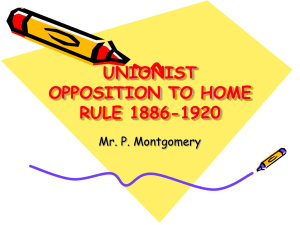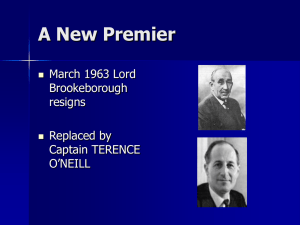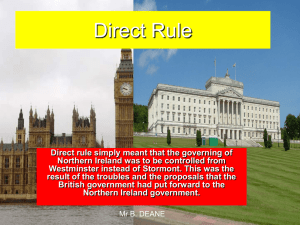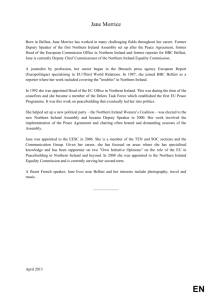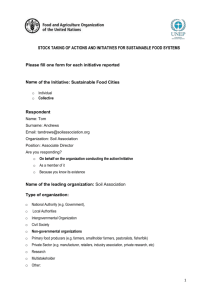James Dawson Chichester-Clark by C. D. C. Armstrong James
advertisement
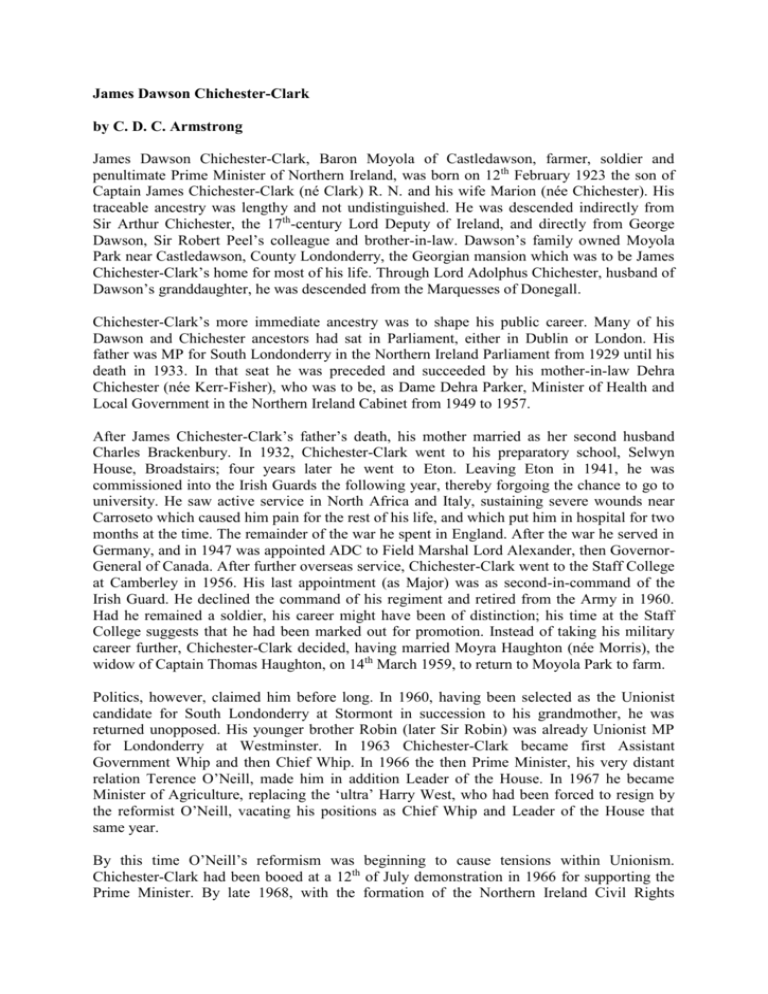
James Dawson Chichester-Clark by C. D. C. Armstrong James Dawson Chichester-Clark, Baron Moyola of Castledawson, farmer, soldier and penultimate Prime Minister of Northern Ireland, was born on 12th February 1923 the son of Captain James Chichester-Clark (né Clark) R. N. and his wife Marion (née Chichester). His traceable ancestry was lengthy and not undistinguished. He was descended indirectly from Sir Arthur Chichester, the 17th-century Lord Deputy of Ireland, and directly from George Dawson, Sir Robert Peel’s colleague and brother-in-law. Dawson’s family owned Moyola Park near Castledawson, County Londonderry, the Georgian mansion which was to be James Chichester-Clark’s home for most of his life. Through Lord Adolphus Chichester, husband of Dawson’s granddaughter, he was descended from the Marquesses of Donegall. Chichester-Clark’s more immediate ancestry was to shape his public career. Many of his Dawson and Chichester ancestors had sat in Parliament, either in Dublin or London. His father was MP for South Londonderry in the Northern Ireland Parliament from 1929 until his death in 1933. In that seat he was preceded and succeeded by his mother-in-law Dehra Chichester (née Kerr-Fisher), who was to be, as Dame Dehra Parker, Minister of Health and Local Government in the Northern Ireland Cabinet from 1949 to 1957. After James Chichester-Clark’s father’s death, his mother married as her second husband Charles Brackenbury. In 1932, Chichester-Clark went to his preparatory school, Selwyn House, Broadstairs; four years later he went to Eton. Leaving Eton in 1941, he was commissioned into the Irish Guards the following year, thereby forgoing the chance to go to university. He saw active service in North Africa and Italy, sustaining severe wounds near Carroseto which caused him pain for the rest of his life, and which put him in hospital for two months at the time. The remainder of the war he spent in England. After the war he served in Germany, and in 1947 was appointed ADC to Field Marshal Lord Alexander, then GovernorGeneral of Canada. After further overseas service, Chichester-Clark went to the Staff College at Camberley in 1956. His last appointment (as Major) was as second-in-command of the Irish Guard. He declined the command of his regiment and retired from the Army in 1960. Had he remained a soldier, his career might have been of distinction; his time at the Staff College suggests that he had been marked out for promotion. Instead of taking his military career further, Chichester-Clark decided, having married Moyra Haughton (née Morris), the widow of Captain Thomas Haughton, on 14th March 1959, to return to Moyola Park to farm. Politics, however, claimed him before long. In 1960, having been selected as the Unionist candidate for South Londonderry at Stormont in succession to his grandmother, he was returned unopposed. His younger brother Robin (later Sir Robin) was already Unionist MP for Londonderry at Westminster. In 1963 Chichester-Clark became first Assistant Government Whip and then Chief Whip. In 1966 the then Prime Minister, his very distant relation Terence O’Neill, made him in addition Leader of the House. In 1967 he became Minister of Agriculture, replacing the ‘ultra’ Harry West, who had been forced to resign by the reformist O’Neill, vacating his positions as Chief Whip and Leader of the House that same year. By this time O’Neill’s reformism was beginning to cause tensions within Unionism. Chichester-Clark had been booed at a 12th of July demonstration in 1966 for supporting the Prime Minister. By late 1968, with the formation of the Northern Ireland Civil Rights Association, pressure for change was growing, especially in the two most contentious areas – the local government franchise and housing allocation. London, hitherto relatively distant in its relations with Stormont, began to take a more interventionist role in Northern Irish affairs. On 4th November 1968, O’Neill and two of his cabinet colleagues (Brian Faulkner and Bill Craig) discussed reforms in London with Harold Wilson and his Home Secretary, James Callaghan. In subsequent discussions in the Northern Ireland cabinet, Chichester-Clark, according to a civil servant witness, ‘made a major and positive contribution’ [Bloomfield, p. 99]. In cabinet on 14th November 1968 he raised a number of proposals for change which he and his brother had drawn up together at Moyola Park. He supported a suggestion by the backbencher Edmond Warnock for an amnesty for prosecutions for the previous month’s Civil Rights march in Londonderry, which had resulted in clashes between marchers and the police. He also made more concrete proposals including abolition of the company vote and measures to ensure fair allocation of public housing ‘and to prevent the wholly indefensible approach of certain authorities’; he also suggested a referendum about the local government franchise [PRONI CAB/4/1414/15]. The following week, on 20th November, while still calling for a package of reforms, Chichester-Clark stated that Wilson should be told that ‘a move to universal adult suffrage [i.e. in local government elections] was not politically feasible at present’ [PRONI CAB/4/1418/11]. It was Chichester-Clark’s caution on the franchise question and his growing lack of confidence in the Prime Minister that helped end O’Neill’s premiership. By the spring of 1969 dissension was rife within the Unionist Party. Chichester-Clark was one of two ministers who expressed doubts as to the wisdom of making an early announcement of the government’s acceptance in principle of the need to implement the universal franchise in the next local government elections. Both he and the Minister of Development feared that such a decision would stir up Protestant resistance. On 23rd April 1969 he resigned, with a statement voicing his fear that early movement on the franchise might lead to bloodshed. O’Neill’s own resignation followed on 28th April, and in the ensuing leadership election within the party (1st May), the two candidates were Chichester-Clark and Faulkner. Chichester-Clark won by 17 votes to 16 among Unionist MPs. That Faulkner ran ChichesterClark close is not surprising: he was more experienced and more prominent. But he also had a reputation as a hardliner to live down. At least one of his erstwhile cabinet colleagues – Faulkner had resigned some time before Chichester-Clark – detested him. Chichester-Clark’s resignation may have gained him some ultra support but his backers, O’Neill included, tended to be reformers. To one new backbencher he seemed more forceful than Faulkner. There is no evidence to support J. J. Lee’s assertion (derived ultimately from Brian Faulkner) that Chichester-Clark’s resignation had been arranged in collusion with O’Neill in order to prepare for the former’s succession to the leadership: indeed, the Prime Minister had urged Robin Chichester-Clark to ask his brother not to resign. Nor is there much to be said for Maurice Hayes’s suggestion that Chichester-Clark’s election was ‘a symbol of the antipathy to Faulkner of the landed gentry who had dominated the ranks of Unionism’ [Hayes, p. 124]. Chichester-Clark’s supporters included non-gentry Unionists and there is reason to believe that O’Neill resented Chichester-Clark’s resignation. Having been appointed Prime Minister, Chichester-Clark made some changes to the composition of the government; most notably, Brian Faulkner became Minister of Development; the other two leading ultras, West and Craig, remained excluded, and both proved to be adversaries of the new Prime Minister. In the Commons on 6th May Chichester- Clark announced an amnesty for those involved with political protests between 5th October 1968 and 6th May 1969. The decision had been previously discussed in cabinet. The following day he declared that he would implement changes to the local government franchise. At a cabinet meeting on 8th July it was decided that changes to the electoral law would be introduced in October. By late May 1969, James Callaghan (who as Home Secretary had responsibility for Northern Ireland in the United Kingdom cabinet) reported that Chichester-Clark had made more progress than had been expected. However, events moved quickly towards the first crisis of his premiership – a crisis whose consequences dominated the remainder of his time in office. Even before the Apprentice Boys’ parade in Londonderry on 12th August, there were expressions of concern that a demonstration by this order would result in disorder. Callaghan told the cabinet in London that the Northern Ireland government might have to ask for military assistance. Such fears were not universal: Robert Porter, the Home Affairs minister, informed the cabinet on 31st July that there was no evidence of probable resistance to the parade. In its meeting on 11 th August, the Northern Ireland cabinet voiced its desire to avoid the use of troops. There was anxiety lest, in the event of a continuing deployment of troops, direct rule might be imposed. Callaghan told Chichester-Clark on 6th August that ‘it was a case of taking over all of Northern Ireland’s affairs or none’ [PRONI CAB/4/1458/14]. In their conversation of 6th August, Callaghan had expressed to Chichester-Clark his satisfaction with the progress of reforms. However, on 11th August those Northern Ireland ministers concerned with reforms were asked to examine the possibility of accelerating implementation. The cabinet also considered the cancellation of the Londonderry parade, but thought a well-marshalled full march preferable to a smaller one ‘which might include the least reliable element’ [PRONI CAB/4/1458/15]. The 12th August demonstration resulted in disorder on a large scale after the marchers were attacked by elements within the population of the nationalist Bogside area. Responsibility for order rested on the RUC, then a force little more than 3000 strong. As events worsened in Londonderry the Ulster Special Constabulary were deployed. Disorder spread to Belfast and elsewhere. Over a three-day period, 8 died and many were injured. The RUC used CS gas and baton charges. Jack Lynch, the Irish Taoiseach, called for intervention by the UN and proposed the deployment of Irish army field hospitals along the border; Chichester-Clark attacked him for his interference. Even before the parade, Stormont had been told by the Home Office that it ‘would have to be seen to have exhausted all the resources under its own control, including the ‘B’ Specials, before a request for any aid could be contemplated’ [Bloomfield, p. 112]. Those resources were rapidly exhausted. On 13th August the Stormont cabinet discussed the use of the army but agreed that ‘contingency planning on the basis of a surrender of law and order powers’ would be unacceptable [PRONI CAB/4/1459/12]. Nevertheless, military assistance was called for on 14th August. On 19th August Chichester-Clark and three cabinet colleagues flew to London to meet Wilson and Callaghan. At the meeting, Chichester-Clark (having agreed on the proposal with the Inspector-General of the RUC) suggested that the GOC Northern Ireland should assume supreme control of the RUC and USC alongside that of his own forces. In a draft of a speech delivered to the Ulster Unionist Council on 24th October 1969, Chichester-Clark presented this as a means of gaining time and avoiding ‘direct and irreversible action at that most dangerous moment’ [PRONI PM/5/31/23]. The meeting also agreed on a commission to consider policing arrangements in Northern Ireland; accounts differ as to whether or not this commission was proposed by London or Belfast, with Chichester-Clark’s own account suggesting the latter. The commission was supposed to be purely advisory. However, in a broadcast after the meeting, Wilson indicated that the USC (a force especially disliked by Nationalists) was on its way out. The communiqué issued after the meeting stated that every ‘citizen of Northern Ireland is entitled to the same equality of treatment and freedom from discrimination as obtains in the rest of the United Kingdom, irrespective of political views or religion’ [Callaghan, pp. 189-192 at p. 192]. At a cabinet meeting the next day Chichester-Clark reported that the Northern Ireland deputation had exceeded its remit in London but sought (and received) retrospective approval from his colleagues. At Stormont reform continued. A Ministry of Community Relations was established [PRONI CAB/4/1477/35]. At the same meeting on 25th September a prohibition on processions was introduced for three months. On 8th October the cabinet agreed, ‘if no other alternative was open to them’, to set up a centralised housing system [PRONI CAB/4/1483/13]. Despite misgivings expressed at the cabinet meeting on 7th October, Chichester-Clark agreed to accept the recommendations of the Hunt Committee, which proposed the disarming of the RUC and the establishment of a new security force under army control (later known as the Ulster Defence Regiment) to replace the USC. Chichester-Clark’s support for Hunt’s proposals was to cause him much difficulty: the USC had been in practice exclusively Protestant and had enjoyed considerable support among Unionists. He argued that while the changes lacked the assent of the Unionist population, ‘they would have liked still less what could have happened [The News Letter, 14th October 1969]. In a speech drafted for delivery to the UUC on 24th October, the Prime Minister stated that if Unionism rejected change, ‘places its reliance on empty threats, then our constitutional position would be in the greatest peril’ [PRONI PM/5/31/23]. Opposition to reform did not ebb away in 1970, and was led particularly by Craig and West, the former characterising the government as ‘weak, bumbling and inept’ [The Financial Times, 10th August 1970]. Chichester-Clark narrowly survived a no-confidence motion in his own constituency in August 1970. Autumn saw speculation that Faulkner would take over. There continued to be tension between Stormont and London: in March, Chichester-Clark had attacked Wilson for remarks about the record of the Unionist Party. The return of the Conservatives to office in the United Kingdom general election seemed initially to offer an easier relationship with Westminster. Robin Chichester-Clark was on good terms with Edward Heath, having been his colleague in the administrations of Macmillan and Douglas-Home. After a meeting with the new Home Secretary (Reginald Maudling), James Chichester-Clark told his parliamentary party that ‘where there has been suspicion in the past there was now relationship and trust’ [PRONI/D/327/22/4]. He did warn his party that he expected Maudling to continue his predecessor’s policies. But throughout 1970 the security situation worsened, and the problems which arose from civil disorder plagued the rest of Chichester-Clark’s premiership, ensuring that any hope of a better understanding with London was to be undermined. The foundation of the Provisional IRA in 1970 brought a more aggressive form of Republicanism onto the scene. Chichester- Clark took a more direct responsibility for security in August 1970 when, following the resignation of the Home Affairs Minister Robert Porter (who, in ill health, left office to resume his career at the bar), he himself took over the portfolio, appointing John Taylor Minister of State at Home Affairs. These decisions were regarded by one well-placed observer as mistaken. As matters deteriorated, Chichester-Clark’s will to continue weakened, according to Faulkner. The security situation was ‘the basis of the chorus of internal party criticism which never let up’ [Walker, p. 188]. Chichester-Clark was also sensitive to criticism that his administration was acting only at the behest of the UK government. During the final three months of Chichester-Clark’s premiership, the problem of violence continued to dominate. In this period 19 people died in addition to the 29 who had died the previous year. In the Northern Ireland Commons on 27 January 1971 Chichester-Clark denied the existence of No Go areas, that is, republican controlled regions which the security forces preferred not to penetrate. He was wrong-footed by the Reverend Ian Paisley (who had already emerged as a hardline loyalist critic outside the Unionist Party). Paisley produced RUC reports which appeared to contradict Chichester-Clark. Westminster was beginning to take an interest in internment as a solution, and contingency studies were prepared. The previous year, Chichester-Clark’s ally, Robert Porter, had told the cabinet on 20th July that the ‘adverse repercussions’ of internment ‘would outweigh any likely benefit’ [PRONI CAB/4/1535/18]. While Chichester-Clark said in the Commons on 27th January that he would implement internment if so advised, in private he expressed unease. At a meeting at Chequers with Heath, Maudling, and Lord Carrington (Secretary of State for Defence) on 13th March 1971 he told them that he and the RUC were opposed to it. Earlier still, he had expressed opposition in a telephone conversation with Heath on 9th March. In the meantime, the security situation worsened. On 9 March 1971 three Scottish soldiers were murdered by PIRA. Chichester-Clark sought an increase in troop levels. Ronald Burroughs, the UK representative in Northern Ireland, was unsympathetic to ChichesterClark. He told the Home Office that only ‘military window-dressing’ should be given [The National Archives PREM 15/476]. He was reported as believing that Chichester-Clark had shot his bolt. On 16th March Chichester-Clark had further discussions in London with Heath, Maudling and Carrington. He asked for reinforcements, which would, he believed, enable the army more to oppose PIRA more effectively. He also wanted more cordons and curfews, voicing fears of a Protestant uprising if violence was not tackled. Time, he believed, was fast running out. He was offered no more than 1300 troops, fewer than half the number he wanted. Carrington had told him on 16th March that there was no justification for an increase in the army’s strength. Chichester-Clark decided to resign. Heath claimed that this surprised him, but Sir Kenneth Bloomfield, the senior Northern Ireland civil servant, has noted that at all of the meetings of the two Prime Ministers in March 1971, Chichester-Clark described ‘in increasingly desperate terms the pressures mounting upon him for more decisive action against terrorism’ [Bloomfield, p. 135]. In a later interview Chichester-Clark revealed that he feared that his failure to extract support from Westminster would result in a no-confidence motion against him. On 19th March, Chichester-Clark tried to contact Maudling to tell him of his decision to go. Maudling was at a lunch at his old school which, according to one of those present, consisted largely of whisky. So Maudling was too incapacitated to speak to him, and it was Heath who took the call at 5.00pm. Carrington was sent to Belfast to try to persuade him to stay. But, as no more concessions were on offer, he failed. On 20th March Chichester-Clark announced his resignation. In his statement he declared that he saw ‘no other way of bringing home to all concerned the realities of the present constitutional, political and security situation’ [Bloomfield, p. 136]. Heath told his cabinet that Chichester-Clark had avoided ‘recriminations against the United Kingdom government’ [Walker, p. 189]. Chichester-Clark asked his younger brother not to talk of the circumstances of his resignation. Chichester-Clark retained his Stormont seat until the Parliament of Northern Ireland was prorogued in 1972. In June 1971 he was made a life peer, taking the title of Baron Moyola of Castledawson. Thereafter he turned mainly to the management of his estate rather than to public affairs. Part of his land at Moyola Park was converted into a golf club. On 26 th November 1985 he spoke in the Lords against the recently concluded Anglo-Irish Agreement. In a later interview he expressed resignation concerning the agreement. Later still Moyola was a supporter of the Belfast Agreement. For a time he belonged to the Unionist Party of Northern Ireland formed by Brian Faulkner after the collapse of the power-sharing Executive in 1974. Once the UPNI ceased to exist he joined no other party. He died on 17th May 2002 aged 79. He was survived by his wife, two daughters, and one stepson. Assessments of Chichester-Clark’s public career and of his qualities as a political leader have tended to be lukewarm if not thoroughly hostile. J. J. Lee writes of his ‘somnambulatory premiership’ [Lee, p. 435]. Maurice Hayes regarded him as ‘a cruel caricature as a prime minister’ [Hayes, pp. 123-24]. O’Neill thought he had a ‘very unpolitical mind’ and believed if he had been at Westminster he would have remained ‘one of the knights of the shire’ [O’Neill, p. 129]. Jack Sayers, the liberal Unionist editor of The Belfast Telegraph, writing before Chichester-Clark became Prime Minister, noted that he was ‘a nice man, but not a politician’ [Gailey, p. 117]. Lord Morgan wrote of him as ‘a politician of traditional outlook and limited ability’ [Morgan, p. 346]. Many judgements of Chichester-Clark’s abilities are essentially superficial, based on nothing more substantial than his appearances on television. F. S. L. Lyons observed ‘his habitual air of shambling bewilderment as of an amateur fallen among professionals’ [Lyons, p. 765]. In truth, it would seem that he did indeed have ‘a certain hesitancy of speech’ [Bloomfield, p. 73]. Any considered account of his legacy must, however, rest on his record, not his manner. One account of Chichester-Clark’s achievement concludes that ‘He may be said to have at least put into black and white what were only ideas in Terence O’Neill’s head [Kelly, p. 7]. It is hard to quarrel with this verdict. O’Neill promised rather than achieved reform. To the Unionist backbencher and former cabinet minister Edmond Warnock, Chichester-Clark was indeed more impressive than his predecessor; he wrote to the new Prime Minister on 16th February 1970 in the belief that ‘for the first time in years a Unionist Prime Minister has a real chance of getting some confidence in the good intentions of Unionist government [PRONI PM/5/2/1/21]. Chichester-Clark’s achievement was considerable: by the end of his premiership the demands of the Civil Rights movement had been met on housing allocation and on local government franchise and structure. Like O’Neill, Chichester-Clark had to contend with opposition from within his party. However, unlike O’Neill, he was not faced by any considerable resistance from within his cabinet. His style as Prime Minister was less aloof, less ‘presidential’ than O’Neill’s. To a greater extent than O’Neill he was obliged to deal with Unionist opposition from outside his party – especially from Ian Paisley – and with objections to his policies from Nationalist politicians. Furthermore, as Prime Minister he confronted much more violence than O’Neill experienced in office; his premiership saw the effective start of the Troubles and the deployment of troops in aid of the civil power in Northern Ireland. Security problems dominated his time as head of the government, and in the end they conspired to destroy his political career. It can be argued that his approach to military policy was vindicated by events. When he left office the total number of troops and police in Northern Ireland at a time of disorder was considerably lower than it was thirty years later in the period of relative peace which followed the Belfast Agreement. Moreover, by the end of his term as Prime Minister, the RUC was routinely unarmed, and the bulk of the responsibility for maintaining order rested on the army. Chichester-Clark’s case for an increase in troop levels was sound; within a few years of his departure the military presence in Ulster had increased to a point far higher than he had contemplated. His belief that the problem of ‘No Go’ areas had to be tackled by the army was one shared, eventually, by William Whitelaw, the first direct-rule Secretary of State for Northern Ireland. His judgement on internment also appears good. When Faulkner introduced internment later in 1971 it proved (as Porter had predicted) that the adverse repercussions outweighed the benefits; opposition to the measure among Nationalists and Republicans only worsened the violence. Nor can it be maintained that Chichester-Clark lacked vision or that his relief at laying down office was complete. Writing to the wife of a parliamentary colleague on 30th March 1971 he noted that he felt some relief that he had no longer to hear new atrocities announced down the telephone but also that he regretted ‘leaving unfinished business behind’ [PRONI/D/2962/1/5/2]. His alignment within his party was essentially with its reformist wing. Chichester-Clark had helped to outline the scope for reform as a member of O’Neill’s cabinet, and, despite his resignation in April 1969, he continued with those reforms as Prime Minister. His own cabinet, containing as it did Phelim O’Neill, Robert Simpson and Robert Porter, but without the presence of West and Craig, was perhaps the most liberal ever in Northern Ireland. He expressed his reformist views both in private and in public. In a letter to an academic, he wrote ‘now that a crisis has arisen, the moderates find difficulty in influencing party affairs ... the proper course is to stay and persuade’ [PRONI PM/5/31/23]. Chichester-Clark’s view of his political role was that his administration had been trying ‘to show members of the minority who want to play a constructive part that there is a place in Northern Ireland for everyone: to demonstrate to Westminster and Whitehall that we care for all our citizens and are ready to accept British standards of justice and equality in all respects’ [The Guardian, 12th September 1970]. He was also aware that as the head of a devolved administration his room for independent action was limited, and that Northern Ireland was financially dependent on London. He therefore conceived (as he put it in a speech written for delivery in the 1970 general election) that Northern Ireland’s relationship with Great Britain was in the nature of a contract. ‘That contract can never fail if we show our willingness to be truly British in all things’ [PRONI PM/5/161/3]. It was his sense of dependency and of the contractual nature of the Union that led ChichesterClark to be generally deferential in his dealings with the United Kingdom government; in the end it was the failure of his attempts to attain a sufficient degree of reciprocity in the relationship of the devolved and sovereign governments that led to his resignation. Sources: Private information: Letters from Sir Kenneth Bloomfield (24th March 2005) and Sir Robert Porter (undated, March 2005). Interviews with Sir Robin Chichester-Clark (5th March 2005) and Lady Moyola (10th March 2005). Obituaries: The Independent, 20 May and 4 June, 2002 The Times, 20 May 2002 The Daily Telegraph, 20 May 2002 Archival sources: The Public Record Office of Northern Ireland CAB/4 Cabinet Conclusions PM/5 Prime Minister’s Papers D/1327 Minutes of the Ulster Unionist Parliamentary Party [courtesy of photocopies supplied by Professor Henry Patterson] D/2962 Papers of the Rt Hon. Basil McIvor National Archives, Kew PREM 15/475 and 15/476 [courtesy of transcripts supplied by Professor Alvin Jackson] Linen Hall Library Belfast Northern Ireland Office Press Cuttings The Parliamentary Debates (Hansard) House of Lords Parliament of Northern Ireland Parliamentary Debates (Hansard) House of Commons Books: Baston, Lewis. Reggie: the Life of Reginald Maudling (Stroud, 2004) Bloomfield, Kenneth. Stormont in Crisis: a Memoir (Belfast, 1994) Callaghan, James. A House Divided: the Dilemma of Northern Ireland (London, 1973) Currie, Austin. All Hell Will Break Loose (Dublin, 2004) Fanning, Ronan. ‘Playing it Cool: the Response of the British and Irish Governments to the Crisis in Northern Ireland’, Irish Studies in International Affairs 12 (2001), pp. 57-85 Faulkner, Brian. Memoirs of a Statesman (London, 1978) Gailey, Andrew. Crying in the Wilderness: Jack Sayers: a Liberal Editor in Ulster, 19391969 (Belfast, 1995) Harkness, David. Northern Ireland since 1920 (Dublin, 1983) Hayes, Maurice. Minority Verdict: Experiences of a Catholic Public Servant (Belfast, 1995) Heath, Edward. The Course of My Life: My Autobiography (London, 1998) Hezlet, Arthur. The ‘B’ Specials: A History of the Ulster Special Constabulary (London, 1972) Insight Team (The Sunday Times). Ulster (Harmondsworth, 1972) Kelley, Henry. How Stormont Fell (Dublin, 1972) Lee, J. J. Ireland 1912-1985: Politics and Society (Cambridge, 1989) Lyons, F. S. L. Ireland since the Famine (London, 1973) McIvor, Basil. Hope Deferred: Experiences of an Irish Unionist (Belfast, 1998) Morgan, K. O. Callaghan: a Life (Oxford, 1997) Mulholland, Marc. Northern Ireland at the Crossroads: Ulster Unionism in the O’Neill Years 1960-9 (Basingstoke, 2000) O’Neill, Terence. The Autobiography of Terence O’Neill (London, 1972) Patterson, Henry. Ireland since 1939 (Oxford, 2002) Scoular, Clive. James Chichester-Clark, Prime Minister of Northern Ireland (Killyleagh, 2000) Walker, Graham. A History of the Ulster Unionist Party: Protest, Pragmatism and Pessimism (Manchester, 2004) Warner, Geoffrey. ‘Putting Pressure on O’Neill: the Wilson Government and the Northern Ireland, 1964-69’, Irish Studies Review 13 (2005), pp. 13-31.
